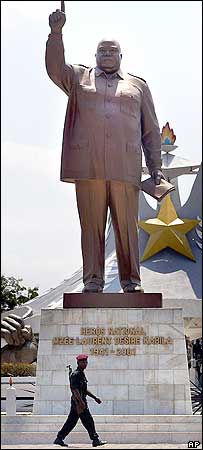Andrei Lankov writes in Newsweek:
North Korea will never follow the Chinese path because its circumstances are profoundly different. The biggest factor is the existence of a rich and free South Korea across the border. Southerners share the same language and culture as the dirt-poor North, but their per capita income is at least 20 times higher—and at the moment, average North Koreans are ignorant of the gap. The regime’s self-imposed isolation is so draconian that even owning a tunable radio set is a crime. If North Korea started reforming, it would be flooded with information about South Korea’s prosperity. This would make North Koreans less fearful of the authorities and more likely to push for unification with their far richer cousins, just as the East Germans pushed to rejoin the West.
Knowing all this, North Korea’s rulers will do whatever they can to maintain control. Given the weakness of its Stalinist economy, this means coming up with new ways to squeeze aid from the outside world. In order to keep the money flowing—with as few conditions as possible—Kim is likely to continue engaging in risky brinkmanship and blackmail. To survive, Pyongyang has to be, or appear to be, dangerous and unpredictable.
But such tactics could easily lead to disaster. The only way to avoid this is to replace the regime.
That’s easier said than done: Military options are unthinkable. And sanctions won’t work either, since China and Russia are unlikely to cooperate fully. Even if Moscow and Beijing did go along, the only likely result would be a lot of dead farmers. North Korea’s great famine of 1996–99 demonstrated that the locals do not rebel when oppressed, even under terrible circumstances. North Koreans are terrified, disorganized and still largely unaware of any alternative to their misery.
But there’s a way to change that equation. The past 15 years have seen the spontaneous growth of grassroots markets in the North and partial disintegration of state controls. Rumors of South Korean prosperity have begun to spread, assisted by popular smuggled DVDs of South Korean movies. The world’s most perfect Stalinist regime is starting to disintegrate from below.
The best way to speed things up is for Washington and its allies to push for active engagement with the North in the form of development aid, scholarships for North Korean students and support for all sorts of activities that bring the world to North Korea or take North Koreans outside their cocoon. Such exchanges are often condemned as a way of appeasing dictators, but the experience of East Europe showed that an influx of uncensored information from the outside is deadly for a communist dictatorship.
Pyongyang understands the danger of such exchanges, but it needs money and technology badly enough that it might allow them nonetheless—so long as they fill its coffers and don’t look too dangerous. This is even more the case when exchanges ostensibly benefit members of the elite. For example, a scholarship program to study overseas would go mostly to students from top families. Yet this wouldn’t limit its impact: experience of the outside world will change these young people and turn some of them into importers of dangerous information. A similarly small step helped to unravel the Soviet Union: the first group of students allowed to study in the U.S., in 1957, numbered just four and were carefully selected. Yet two grew up to become leading reformers, and one of them—Alexander Yakovlev—is often credited as having been the real mastermind behind perestroika.
Read the full article here:
Newsweek
Andrei Lankov
4/18/2009

